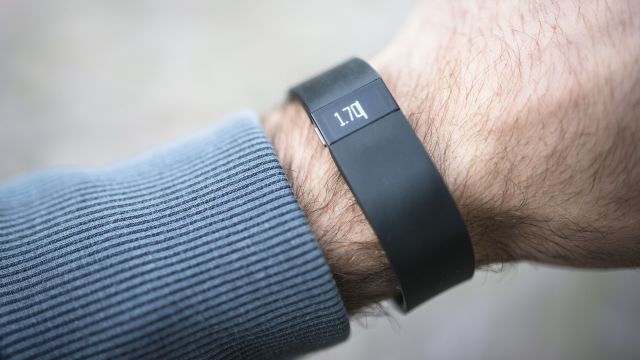Wearable fitness trackers are great tools to help you get in shape—they can track your steps and tell you how many calories you’ve burned. Some trackers also have heart rate monitors and, as one New Jersey man found out, that helped doctors get him better faster.
The scoop
The man arrived in the emergency department of Our Lady of Lourdes Medical Center in Camden, New Jersey after having had a grand mal seizure. He was mostly better after EMTs treated him, but he still had a rapid and irregular heart beat. Doctors confirmed he was having atrial fibrillation, or afib, which occurs when the upper chambers of the heart don’t beat normally due to an electrical disturbance. If left untreated, afib can lead to a stroke or other serious medical conditions.
“Normally when patients come in with atrial fibrillation, if we know when the rhythm disturbance started it changes the way we treat the patient,” says Vivek Sailam, MD, a cardiologist who was part of the man’s treatment team that day. “The patient didn’t have any symptoms of palpitations, so he couldn’t tell us when it started.”
That’s when Dr. Sailam and the other emergency providers noticed the Fitbit on his wrist.
To shock or not?
Not all types of activity trackers monitor and record heart rate. But the model this man was wearing did. In fact, the man’s Fitbit was synced to his phone and had a few days’ worth of data available. The medical staff pulled up the data and found that the afib had started about three hours earlier.
“The Fitbit allowed us to determine the time the rhythm started,” Sailam says. “If we know it started in the past 48 hours, we can shock the heart safely back into a normal rhythm and then send the patient home that day. If we don’t know, we have to admit him into the hospital, put him on blood thinners, and keep him there for two or three days.”
Because Sailam and his colleagues knew the afib had started earlier that day, they were able to perform a procedure called cardioversion that brought the man’s heart rate back to normal. He was able to go home soon after.
A useful tool
An activity tracker with a built in heart rate monitor can be a useful tool, says Sailam. “I’m recommending it to patients if they have afib and don’t usually have symptoms of palpitations or a racing heart beat. It’s a reasonable, non-invasive way to monitor your heart rate at home,” he says.
But Sailam doesn’t see fitness trackers being useful clinically in many other situations. “I think right now, as far as that type of tracker, it can be useful for heart rate only,” he says. “The device was useful in this particular case since it showed a clear time of a significant heart rate spike, but I don’t think there’s utility for determining if someone’s had a heart attack or anything like that. Down the road it may have some other utilities.”
So did the FitBit actually save this patient’s life?
Not necessarily, says Sailam. “His life wasn’t in danger. We were just able to treat him quicker and more effectively,” he says.
“I think the novelty is that we were able to use technology to help treat this patient. It was useful in this case but I’m not sure it’s a game-changer.”
Learn more:
Health Trackers
Health Habits You Should Track
Important Things to Track





